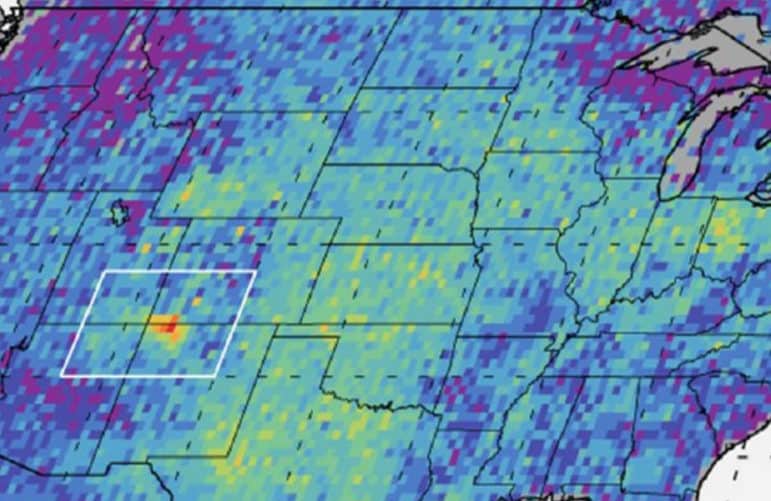
NASA/JPL
The Four Corners area, shown in red, is a major hot spot for methane pollution.
COMMENTARY: Our state is known for breathtaking views, unique public lands and ancient cultures within reach. Tourists choose New Mexico as a destination because of ample opportunities to experience these assets.
We’ve built a bustling and successful tourism industry that depends on our state being in its natural state – an industry that injected $6.1 billion into New Mexico’s economy and supported 89,000 jobs in 2014. A growing reputation around oil and gas pollution threatens this strong and important part of our economy.
Alongside World Heritage Sites, ancient rock formations and sacred sites, New Mexico is home to the largest concentration of methane pollution. Dubbed the Four Corners methane hot spot, oil and gas operations have emitted a plume of methane gas the size of Delaware that hangs over the families and communities that live there.
This is a big deal for Rio Arriba County, too, as we live alongside an estimated 8,000 active oil and gas wells. Not only are harmful, volatile organic compounds emitted alongside methane, it is a powerful climate change pollutant that is 80 times more potent than carbon pollution over 20 years.
To add to the problem, the very things that make New Mexico a tourist destination are most directly impacted by the effects of climate change. Climate change, via erratic weather, lower water levels and wildfire increases, will decrease opportunity for outdoor recreation and directly threatens what makes New Mexico unique.
Reduced opportunities for outdoor recreation will not only impact the quality of life for New Mexicans, but will likely harm the state’s economy because outdoor activities are a major attraction to tourists. Warmer winter temperatures are likely to severely reduce opportunities for snow sports, and ski resorts are already suffering economically. Lower water levels in lakes and rivers adversely impact water sports such as boating, angling, and whitewater rafting. Periods of high fire hazard may further restrict access to wildlands for picnicking, camping, hiking, hunting, birdwatching and other outdoor activities.
We must act by urging our local and state leaders to support the Bureau of Land Managements’ methane waste rule that will require methane emissions to be captured instead of vented, flared and leaked in to the air. These rules require common sense and cost-effective equipment by companies that are themselves creating jobs.
Given our dire economic situation, we should ensure success for as many industries as possible rather than picking winners and losers.
Ron Trujillo is the District 4 Santa Fe city councilor. Amber Espinosa-Trujillo is the Library Services and Technology Act federal grant manager at the New Mexico State Library.